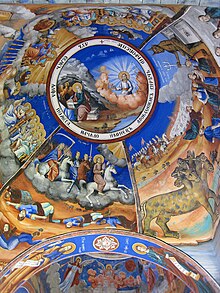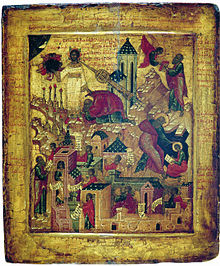Apocalypse

 Clash Royale CLAN TAG#URR8PPP
Clash Royale CLAN TAG#URR8PPP | Part of a series on |
| Eschatology |
|---|
Buddhist
|
Christian
|
Hindu
|
Islamic — Figures —
— Events —
|
Jewish
|
Taoist
|
Zoroastrian
|
Inter-religious
|

Apocalypse depicted in Christian Orthodox traditional fresco scenes in Osogovo Monastery, Republic of Macedonia

St. John at Patmos: the receiving of an apocalyptic vision
An apocalypse (Ancient Greek: ἀποκάλυψις apokálypsis, from ἀπό and καλύπτω, literally meaning "an uncovering"[1]) is a disclosure of knowledge or revelation. In religious and occult concepts it is usually a disclosure of something hidden, "a vision of heavenly secrets that can make sense of earthly realities".[2] Historically, the term has a heavy religious connotation as commonly seen in the prophetic revelations of eschatology and were obtained through dreams or spiritual visions.
It is also the Greek word for the last book of the New Testament entitled "Revelation".[3] The term is also included in the title of some non-biblical canon books involving revelations.[4][5][6] Today, the term is commonly used in reference to any larger-scale catastrophic event, or chain of detrimental events to humanity or nature.[7] In all contexts, the revealed events usually entail some form of an end time scenario or the end of the world or revelations into divine, heavenly, or spiritual realms.
Contents
1 Origination
1.1 Dreams and visions
2 Symbolism
2.1 Numerical
2.2 Lengths of time / periods
2.3 Descriptions
3 Result/purpose
3.1 End of the age
4 See also
5 References
6 Further reading
7 External links
Origination
Dreams and visions

Viktor Vasnetsov, the Four Horsemen of the Apocalypse
The revelation may be made through a dream, as in the Book of Daniel, or through a vision, as in the Book of Revelation. In biblical accounts of revelations the manner of the revelation and its reception is generally described.
Fasting, mainly as part of a spiritual discipline, can lead one into an apocalyptic prophetic vision.[8] One example of this is found in the Book of Daniel which is the first apocalypse in the Protestant Bible.[9] After a long period of fasting,[10] Daniel is standing by a river when a heavenly being appears to him, and the revelation follows (Daniel 10:2ff).
Symbolism

The Seven trumpets.
Numerical
Apocalyptic writing often makes wide use of symbolism. One instance of this occurs where gematria is employed, either for obscuring the writer's meaning or enhancing it; as a number of ancient cultures used letters also as numbers (i.e., the Romans with their use of "Roman numerals"). Thus the symbolic name "Taxo," "Assumptio Mosis", ix. 1; the "Number of the Beast" (616/666), in the Book of Revelation 13:18;[11] the number 666 ('Iησōῦς), Sibyllines, i.326–30.
Lengths of time / periods
Similar is the frequent prophecy of the length of time through which the events predicted must be fulfilled. Thus, the "time, times, and a half," Daniel 12:7 which has been taken to be 3½ years in length by Dispensationalists;[12] the "fifty-eight times" of Enoch, xc.5, "Assumptio Mosis", x.11; the announcement of a certain number of "weeks" or days, which starting point in Daniel 9:24, 25 is "the going forth of the commandment to restore and to build Jerusalem unto the Messiah the Prince shall be seven weeks",[13] a mention of 1290 days after the covenant/sacrifice is broken (Daniel 12:11),[14] 12; Enoch xciii.3–10; 2 Esdras 14:11, 12; Apocalypse of Baruch xxvi–viii; Revelation 11:3, which mentions "two witnesses" with supernatural power,[15] 12:6;[16] compare Assumptio Mosis, vii.1.
Descriptions
Symbolic language also occurs in descriptions of persons, things or events; thus, the "horns" of Daniel 7 and 8;[17]Revelation 17[18] and following; the "heads" and "wings" of 2 Esdras xi and following; the seven seals of Revelation 6;[19] trumpets, Revelation 8;[20] "vials of the wrath of God" or "bowl..." judgments, Revelation 16;[21] the dragon, Revelation 12:3–17,[22]Revelation 20:1–3;[23]
the eagle, Assumptio Mosis, x.8; and so on.
Result/purpose

Russian Orthodox icon Apocalypse

"Apocalyptic I" by contemporary Mexican painter Mauricio García Vega.
End of the age
In the Hebrew Old Testament some pictures of the end of the age were images of the judgment of the wicked and the glorification of those who were given righteousness before God. In the Book of Job and in some Psalms the dead are described as being in Sheol, awaiting the final judgment. The wicked will then be consigned to eternal suffering in the fires of Gehinnom, or the lake of fire mentioned in the Book of Revelation.[21][24][25][26][27]
See also
- Apocalypticism
- Apocalyptic and post-apocalyptic fiction
Apocalypse Series- Christian eschatology
- Hindu eschatology
- Human extinction
- Islamic eschatology
- List of dates predicted for apocalyptic events
- Messianic Age
- Ragnarök
- Ultimate fate of the universe
References
^ "apocalypse | Definition of apocalypse in English by Oxford Dictionaries". Oxford Dictionaries | English. Retrieved 2018-03-17..mw-parser-output cite.citationfont-style:inherit.mw-parser-output qquotes:"""""""'""'".mw-parser-output code.cs1-codecolor:inherit;background:inherit;border:inherit;padding:inherit.mw-parser-output .cs1-lock-free abackground:url("//upload.wikimedia.org/wikipedia/commons/thumb/6/65/Lock-green.svg/9px-Lock-green.svg.png")no-repeat;background-position:right .1em center.mw-parser-output .cs1-lock-limited a,.mw-parser-output .cs1-lock-registration abackground:url("//upload.wikimedia.org/wikipedia/commons/thumb/d/d6/Lock-gray-alt-2.svg/9px-Lock-gray-alt-2.svg.png")no-repeat;background-position:right .1em center.mw-parser-output .cs1-lock-subscription abackground:url("//upload.wikimedia.org/wikipedia/commons/thumb/a/aa/Lock-red-alt-2.svg/9px-Lock-red-alt-2.svg.png")no-repeat;background-position:right .1em center.mw-parser-output .cs1-subscription,.mw-parser-output .cs1-registrationcolor:#555.mw-parser-output .cs1-subscription span,.mw-parser-output .cs1-registration spanborder-bottom:1px dotted;cursor:help.mw-parser-output .cs1-hidden-errordisplay:none;font-size:100%.mw-parser-output .cs1-visible-errorfont-size:100%.mw-parser-output .cs1-subscription,.mw-parser-output .cs1-registration,.mw-parser-output .cs1-formatfont-size:95%.mw-parser-output .cs1-kern-left,.mw-parser-output .cs1-kern-wl-leftpadding-left:0.2em.mw-parser-output .cs1-kern-right,.mw-parser-output .cs1-kern-wl-rightpadding-right:0.2em
^ Bart D. Ehrman, "How Jesus Became God", pg. 59,
ISBN 978-0-06-177818-6
^ Oxford English Dictionary, A, Oxford University Press, p. 386
^ "Apocalypse of Stephen". Wikipedia. 2018-02-13.
^ "Apocalypse of Abraham". Wikipedia. 2018-02-27.
^ "Apocalypse of Paul". Wikipedia. 2018-02-13.
^ Gordon, Scott (May 1973). "Today's Apocalypses and Yesterday's". American Economic Review. 63 (2): 108. JSTOR 1817059.
^ Eggmeier, Matthew (2014). A Sacramental-Prophetic Vision : Christian Spirituality in a Suffering World. Collegeville, MN: Michael Glazier. p. 39. ISBN 9780814680926.
^ Carey, Greg (April 2017). "Daniel as an Americanized Apocalypse". Interpretation: A Journal of Bible and Theology. 71 (2): 190 – via Sage Journals.
^ "Daniel 10:1–4 (King James Version)". Bible Gateway. Retrieved 2007-11-15.
^ "Revelation 13:16–18 (King James Version)". Bible Gateway. 2012. Retrieved 2007-11-21.
^ "Daniel 12:7 (King James Version)". Bible Gateway. Archived from the original on 2007-12-09. Retrieved 2007-11-21.
^ "Daniel 9:24–25 (King James Version)". Bible Gateway. Retrieved 2007-11-21.
^ "Daniel 12:11 (King James Version)". Bible Gateway. Archived from the original on 2007-11-05. Retrieved 2007-11-21.
^ "Revelation 11:3 (King James Version)". Bible Gateway. Archived from the original on 2007-12-09. Retrieved 2007-11-21.
^ "Revelation 12:6 (King James Version)". Bible Gateway. Archived from the original on 2007-12-09. Retrieved 2007-11-21.
^ "Daniel 7; Daniel 8 (King James Version)". Bible Gateway. Archived from the original on 2007-12-09. Retrieved 2007-11-21.
^ "Revelation 17 (King James Version)". Bible Gateway. Archived from the original on 2007-12-09. Retrieved 2007-11-21.
^ "Revelation 6 (King James Version)". Bible Gateway. Archived from the original on 2007-11-15. Retrieved 2007-11-21.
^ "Revelation 8 (King James Version)". Bible Gateway. Archived from the original on 2007-12-09. Retrieved 2007-11-21.
^ ab "Revelation 16 (King James Version)". Bible Gateway. Archived from the original on 2007-12-08. Retrieved 2007-11-21.
^ "Revelation 12:3–17 (King James Version)". Bible Gateway. Retrieved 2007-11-21.
^
"Revelation 20:1–3 (King James Version)". Bible Gateway. Retrieved 2007-11-21.
^ "Revelation 19:20 (King James Version)". Bible Gateway. Archived from the original on 2007-11-07. Retrieved 2007-11-21.
^ "Revelation 20:10 (King James Version)". Bible Gateway. Archived from the original on 2007-12-09. Retrieved 2007-11-21.
^ "Revelation 20:14–15 (King James Version)". Bible Gateway. Retrieved 2007-11-21.
^ "Revelation 21:8 (King James Version)". Bible Gateway. Archived from the original on 2007-11-24. Retrieved 2007-11-21.
Further reading
Morris, Henry M (1985) [1983]. The Revelation Record. Tyndale House and Creation Life.- Collins, John J. (2010) [2010]. The Apocalyptic Imagination: An Introduction to Jewish Apocalyptic Imagination 2nd Ed. Wm. B. Eerdmans Publishing.
- Collins, John J. ed. (2014)[2014]. The Oxford Handbook of Apocalyptic Literature. Oxford University Press.
External links
The Apocalypse on In Our Time at the BBC
It's the End of the World: 8 Potential Armageddons, Fox, Sep 29, 2010.
Bible. N.T. Revelation. Latin. Selections. 1470. Apocalypsis Sancti Johannis. Germany, ca. 1470 48 leaves. illus. 31 cm. From the Rare Book and Special Collections Division at the Library of Congress